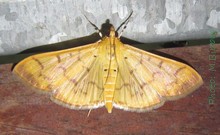
Taiwan, officially the Republic of China (ROC), is a country in East Asia. Neighbouring countries include the People's Republic of China (PRC) to the northwest, Japan to the northeast, and the Philippines to the south. The main island of Taiwan has an area of 35,808 square kilometres (13,826 sq mi), with mountain ranges dominating the eastern two-thirds and plains in the western third, where its highly urbanised population is concentrated. Taipei is the capital as well as the largest metropolitan area of Taiwan. Other major cities include New Taipei, Kaohsiung, Taichung, Tainan and Taoyuan. With 23.57 million inhabitants, Taiwan is among the most densely populated countries.
Mérida or Merida may refer to:

Hornbeams are hardwood trees in the flowering plant genus Carpinus in the birch family Betulaceae. The 30–40 species occur across much of the temperate regions of the Northern Hemisphere.

Yonaguni is a town located entirely on Yonaguni Island in Yaeyama District, Okinawa Prefecture, Japan. It is the westernmost municipality in Japan, and is known for billfish fishing and as a diving spot. In 1987, divers discovered the Yonaguni Monument, a rock formation that some believe may be man-made.

The lime-speck pug is a moth of the family Geometridae. It is a common species throughout the Palearctic region, the Near East and North Africa.
Neopseustidae is a small family of day and night-flying "archaic bell moths" in the order Lepidoptera. They are classified into their own superfamily Neopseustoidea and infraorder Neopseustina. Four genera are known. These primitive moths are restricted to South America and South east Asia and their biology is unknown. Nematocentropus appears to be the most primitive genus occurring in Assam, Myanmar and Sichuan, China, three species of Neopseustis are distributed from Assam to Taiwan, whilst Synempora andesae and three species of Apoplania occur in southern South America. The morphology of the antennae and the proboscis has been studied in detail.

Endoclita is a genus of moths of the family Hepialidae. There are 60 described species found in eastern and southeast Asia and the Indian subcontinent.

The lackey moth is a moth in the family Lasiocampidae. It was first described by Carl Linnaeus in his 1758 10th edition of Systema Naturae. It is common across southern Britain and central Europe. Malacosoma species are notable for their caterpillars which are brightly coloured and form silken tents to regulate their temperature. Malacosoma neustria caterpillars are brown with blue, orange and white stripes. The adults are a fairly uniform brown. The larvae feed mainly on trees and shrubs from within their tents.

The Japanese house bat or Japanese pipistrelle is a species of vesper bat. An adult has a body length of 3.6–4.8 cm (1.4–1.9 in), a tail of 2.9–4.0 cm (1.1–1.6 in), and a wing length of 3.2–3.6 cm (1.3–1.4 in). It prefers to roost under the ceiling or inside the roof of old buildings. It is found across East Asia, from China and Taiwan into the Ussuri region, the Korean Peninsula, and Japan.

The Thyatirinae, or false owlet moths, are a subfamily of the moth family Drepanidae with about 200 species described. Until recently, most classifications treated this group as a separate family called Thyatiridae.

Adoxophyes orana, the summer fruit tortrix, is a moth of the family Tortricidae. It is found in the Palearctic realm and Taiwan.

Arctornis l-nigrum, the black V moth, is a moth of the family Erebidae. The species was described by Otto Friedrich Müller in 1764. It is found in the Palearctic realm and Asia.

Brahmaea wallichii, also known as the owl moth, is a moth from the family Brahmaeidae, the Brahmin moths, and one of its largest species. It is found in the north of India, Nepal, Bhutan, Myanmar, China, Taiwan, and Japan. The owl moth is nocturnal. The wingspan is about 90–160 millimetres.

Ercheia cyllaria is a species of moth of the family Erebidae first described by Pieter Cramer in 1779. It is found in the Indian subregion, Sri Lanka, Taiwan, Japan, Indochina, Thailand, Peninsular Malaysia, Sumatra, Borneo, Seram and the Kai Islands.

Acleris is a genus of moths belonging to the subfamily Tortricinae of the family Tortricidae.

The lobster-clawed moth is a moth of the family Gelechiidae. It is found in most of Europe, except for the Iberian Peninsula and most of the Balkan Peninsula. In the east, the range extends to Siberia and Taiwan.

Pyralis manihotalis is a moth of the family Pyralidae described by Achille Guenée in 1854.
Scopula actuaria is a moth of the family Geometridae. It was described by Francis Walker in 1861. It is found throughout the Oriental tropics of India, Sri Lanka, from Afghanistan and Taiwan to the southern Moluccas and Timor. It is also found on the Chagos Archipelago.

Patania balteata is a moth of the family Crambidae. It was described by Johan Christian Fabricius in 1798. It is found across southern Europe, Africa and Asia, including Japan, Korea, Réunion, Madagascar, Taiwan, Thailand, Turkey and Ukraine, as well as New South Wales and Queensland in Australia. There is also an old record from Hawaii.
Eptesicus pachyomus is a species of bat in the family Vespertilionidae. It is widespread and found throughout Asia.
















